Individual Determinants on Health: A Case Study of Lauren's Problems
VerifiedAdded on 2020/03/04
|6
|1669
|58
Case Study
AI Summary
This case study focuses on Lauren, a 16-year-old girl struggling with alcohol consumption, depression, and behavioral issues. The assignment analyzes Lauren's situation, including her irritable behavior, social withdrawal, and part-time job struggles. It examines the impact of alcohol on her behavior, attention, and impulsivity, referencing relevant research. The analysis explores the counselor's approach, highlighting both effective strategies and mistakes, particularly in handling family dynamics and maintaining patient trust. The study suggests interventions such as addressing the root causes of alcohol consumption, providing family support, and utilizing group therapy to help Lauren overcome her challenges and improve her overall health and well-being, including addressing the issues of depression and her relationship with her stepfather.
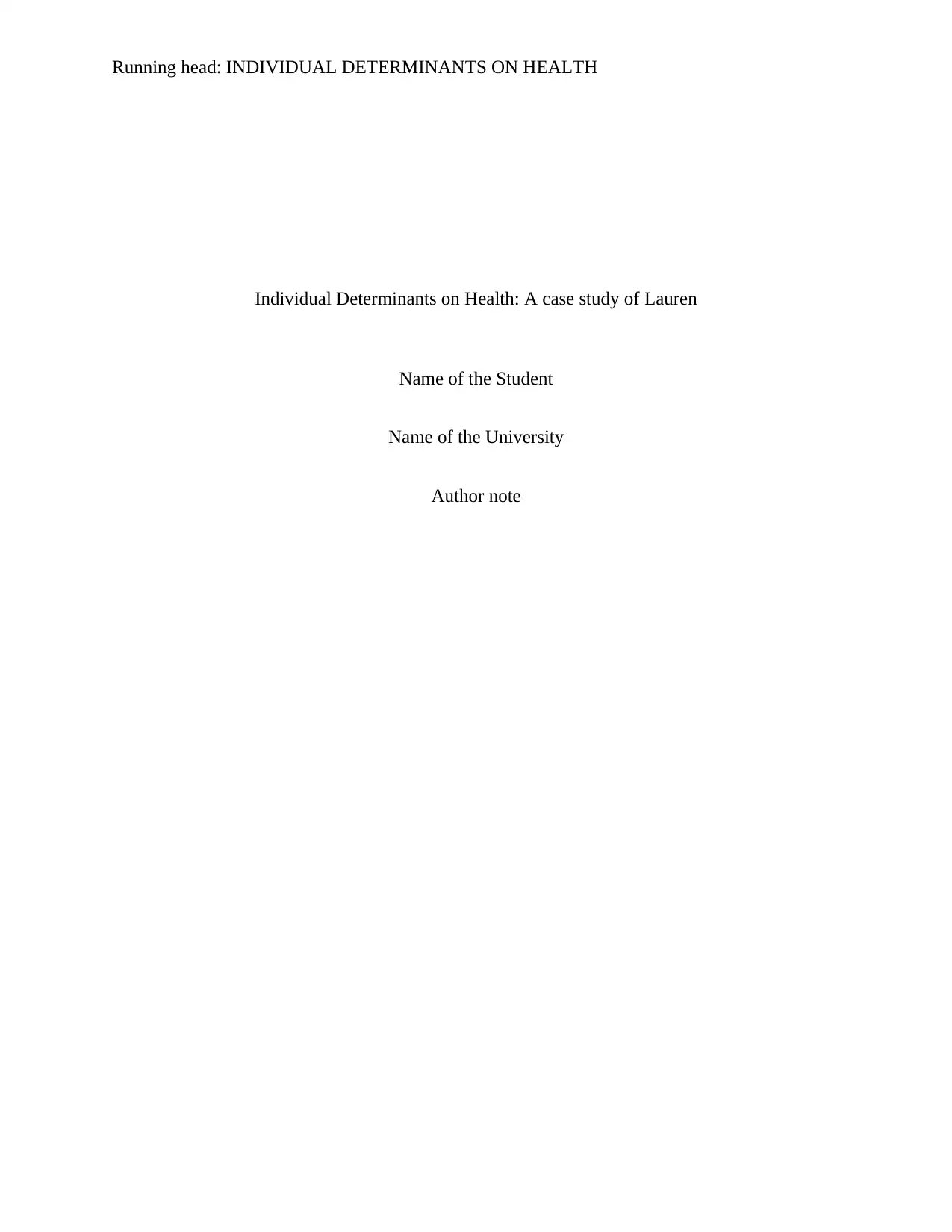
Running head: INDIVIDUAL DETERMINANTS ON HEALTH
Individual Determinants on Health: A case study of Lauren
Name of the Student
Name of the University
Author note
Individual Determinants on Health: A case study of Lauren
Name of the Student
Name of the University
Author note
Paraphrase This Document
Need a fresh take? Get an instant paraphrase of this document with our AI Paraphraser
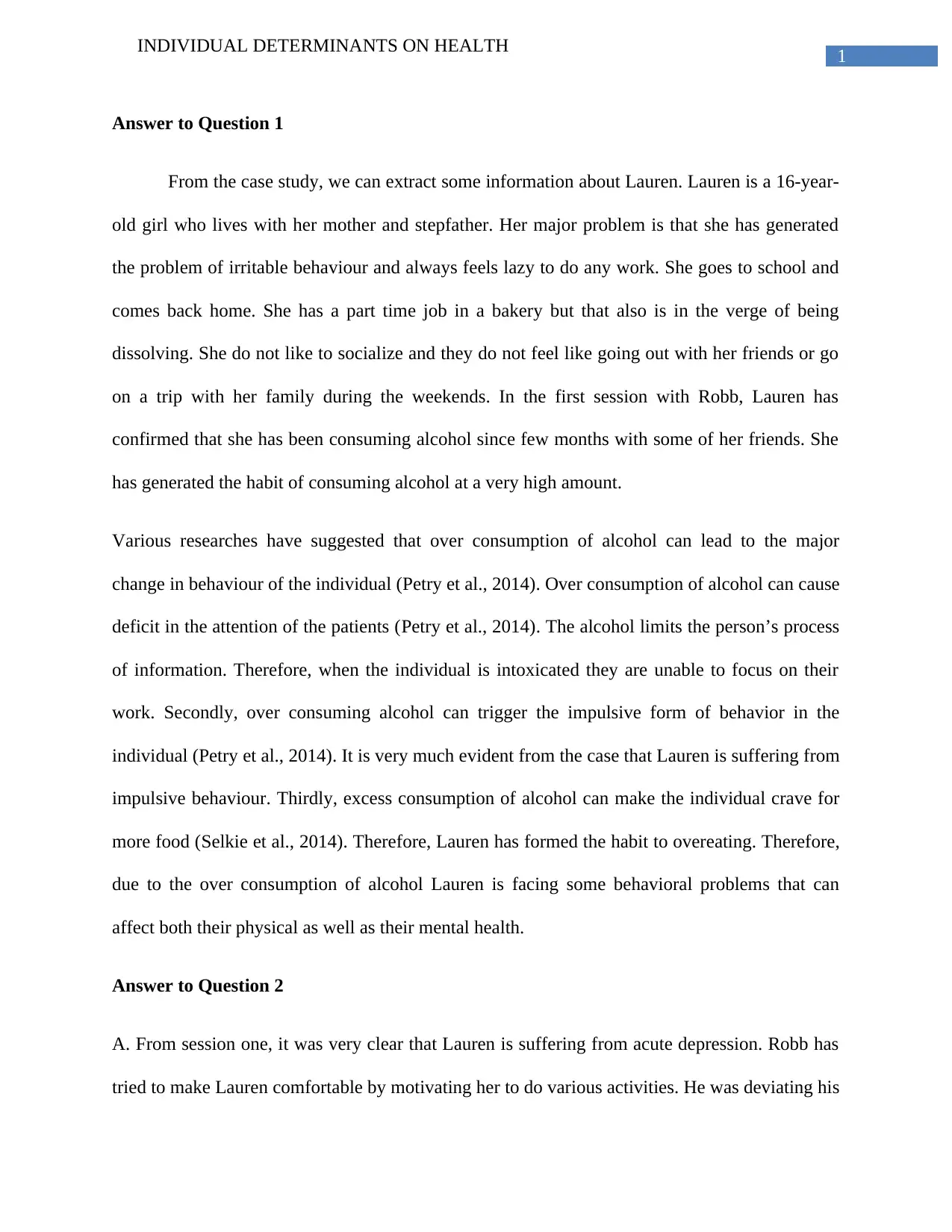
1
INDIVIDUAL DETERMINANTS ON HEALTH
Answer to Question 1
From the case study, we can extract some information about Lauren. Lauren is a 16-year-
old girl who lives with her mother and stepfather. Her major problem is that she has generated
the problem of irritable behaviour and always feels lazy to do any work. She goes to school and
comes back home. She has a part time job in a bakery but that also is in the verge of being
dissolving. She do not like to socialize and they do not feel like going out with her friends or go
on a trip with her family during the weekends. In the first session with Robb, Lauren has
confirmed that she has been consuming alcohol since few months with some of her friends. She
has generated the habit of consuming alcohol at a very high amount.
Various researches have suggested that over consumption of alcohol can lead to the major
change in behaviour of the individual (Petry et al., 2014). Over consumption of alcohol can cause
deficit in the attention of the patients (Petry et al., 2014). The alcohol limits the person’s process
of information. Therefore, when the individual is intoxicated they are unable to focus on their
work. Secondly, over consuming alcohol can trigger the impulsive form of behavior in the
individual (Petry et al., 2014). It is very much evident from the case that Lauren is suffering from
impulsive behaviour. Thirdly, excess consumption of alcohol can make the individual crave for
more food (Selkie et al., 2014). Therefore, Lauren has formed the habit to overeating. Therefore,
due to the over consumption of alcohol Lauren is facing some behavioral problems that can
affect both their physical as well as their mental health.
Answer to Question 2
A. From session one, it was very clear that Lauren is suffering from acute depression. Robb has
tried to make Lauren comfortable by motivating her to do various activities. He was deviating his
INDIVIDUAL DETERMINANTS ON HEALTH
Answer to Question 1
From the case study, we can extract some information about Lauren. Lauren is a 16-year-
old girl who lives with her mother and stepfather. Her major problem is that she has generated
the problem of irritable behaviour and always feels lazy to do any work. She goes to school and
comes back home. She has a part time job in a bakery but that also is in the verge of being
dissolving. She do not like to socialize and they do not feel like going out with her friends or go
on a trip with her family during the weekends. In the first session with Robb, Lauren has
confirmed that she has been consuming alcohol since few months with some of her friends. She
has generated the habit of consuming alcohol at a very high amount.
Various researches have suggested that over consumption of alcohol can lead to the major
change in behaviour of the individual (Petry et al., 2014). Over consumption of alcohol can cause
deficit in the attention of the patients (Petry et al., 2014). The alcohol limits the person’s process
of information. Therefore, when the individual is intoxicated they are unable to focus on their
work. Secondly, over consuming alcohol can trigger the impulsive form of behavior in the
individual (Petry et al., 2014). It is very much evident from the case that Lauren is suffering from
impulsive behaviour. Thirdly, excess consumption of alcohol can make the individual crave for
more food (Selkie et al., 2014). Therefore, Lauren has formed the habit to overeating. Therefore,
due to the over consumption of alcohol Lauren is facing some behavioral problems that can
affect both their physical as well as their mental health.
Answer to Question 2
A. From session one, it was very clear that Lauren is suffering from acute depression. Robb has
tried to make Lauren comfortable by motivating her to do various activities. He was deviating his
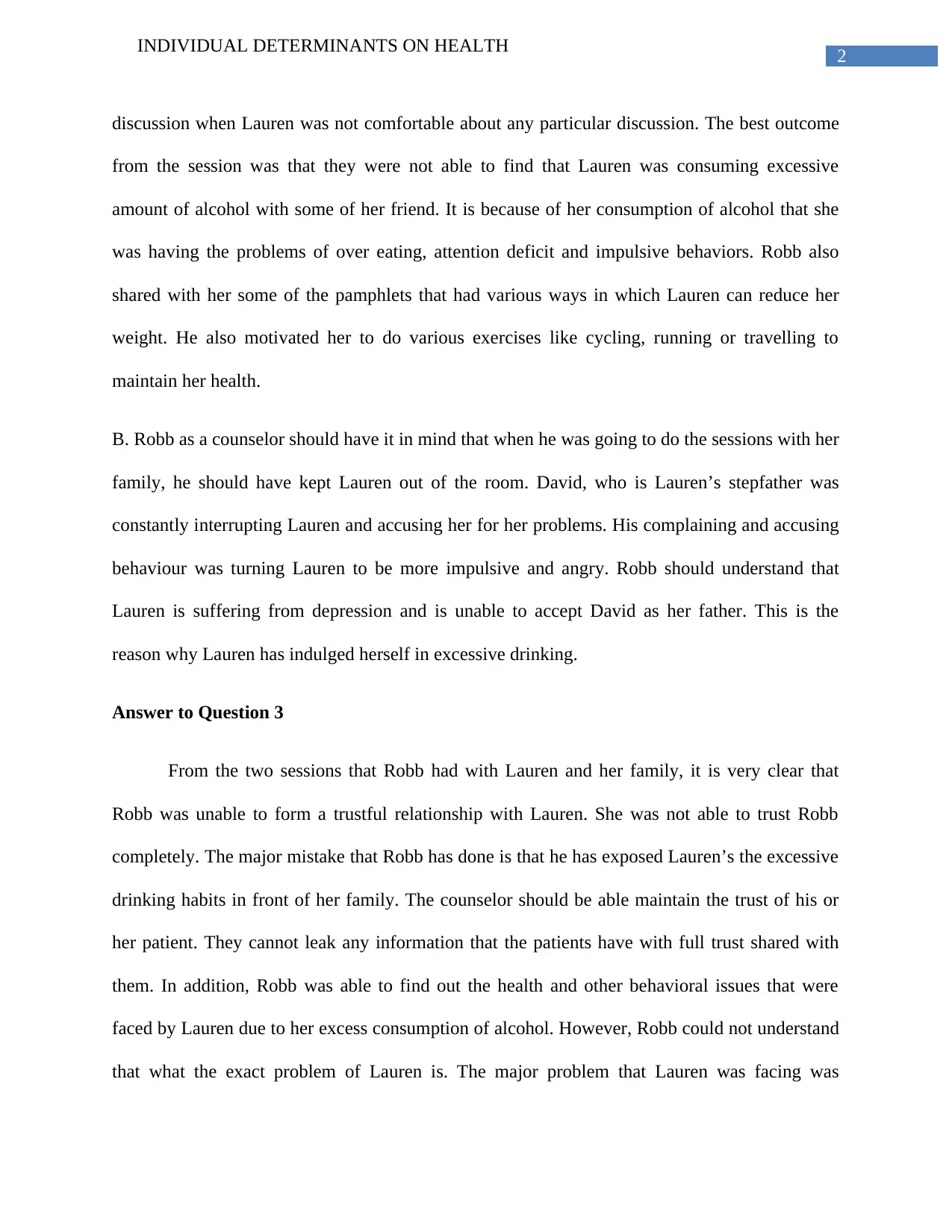
2
INDIVIDUAL DETERMINANTS ON HEALTH
discussion when Lauren was not comfortable about any particular discussion. The best outcome
from the session was that they were not able to find that Lauren was consuming excessive
amount of alcohol with some of her friend. It is because of her consumption of alcohol that she
was having the problems of over eating, attention deficit and impulsive behaviors. Robb also
shared with her some of the pamphlets that had various ways in which Lauren can reduce her
weight. He also motivated her to do various exercises like cycling, running or travelling to
maintain her health.
B. Robb as a counselor should have it in mind that when he was going to do the sessions with her
family, he should have kept Lauren out of the room. David, who is Lauren’s stepfather was
constantly interrupting Lauren and accusing her for her problems. His complaining and accusing
behaviour was turning Lauren to be more impulsive and angry. Robb should understand that
Lauren is suffering from depression and is unable to accept David as her father. This is the
reason why Lauren has indulged herself in excessive drinking.
Answer to Question 3
From the two sessions that Robb had with Lauren and her family, it is very clear that
Robb was unable to form a trustful relationship with Lauren. She was not able to trust Robb
completely. The major mistake that Robb has done is that he has exposed Lauren’s the excessive
drinking habits in front of her family. The counselor should be able maintain the trust of his or
her patient. They cannot leak any information that the patients have with full trust shared with
them. In addition, Robb was able to find out the health and other behavioral issues that were
faced by Lauren due to her excess consumption of alcohol. However, Robb could not understand
that what the exact problem of Lauren is. The major problem that Lauren was facing was
INDIVIDUAL DETERMINANTS ON HEALTH
discussion when Lauren was not comfortable about any particular discussion. The best outcome
from the session was that they were not able to find that Lauren was consuming excessive
amount of alcohol with some of her friend. It is because of her consumption of alcohol that she
was having the problems of over eating, attention deficit and impulsive behaviors. Robb also
shared with her some of the pamphlets that had various ways in which Lauren can reduce her
weight. He also motivated her to do various exercises like cycling, running or travelling to
maintain her health.
B. Robb as a counselor should have it in mind that when he was going to do the sessions with her
family, he should have kept Lauren out of the room. David, who is Lauren’s stepfather was
constantly interrupting Lauren and accusing her for her problems. His complaining and accusing
behaviour was turning Lauren to be more impulsive and angry. Robb should understand that
Lauren is suffering from depression and is unable to accept David as her father. This is the
reason why Lauren has indulged herself in excessive drinking.
Answer to Question 3
From the two sessions that Robb had with Lauren and her family, it is very clear that
Robb was unable to form a trustful relationship with Lauren. She was not able to trust Robb
completely. The major mistake that Robb has done is that he has exposed Lauren’s the excessive
drinking habits in front of her family. The counselor should be able maintain the trust of his or
her patient. They cannot leak any information that the patients have with full trust shared with
them. In addition, Robb was able to find out the health and other behavioral issues that were
faced by Lauren due to her excess consumption of alcohol. However, Robb could not understand
that what the exact problem of Lauren is. The major problem that Lauren was facing was
⊘ This is a preview!⊘
Do you want full access?
Subscribe today to unlock all pages.

Trusted by 1+ million students worldwide
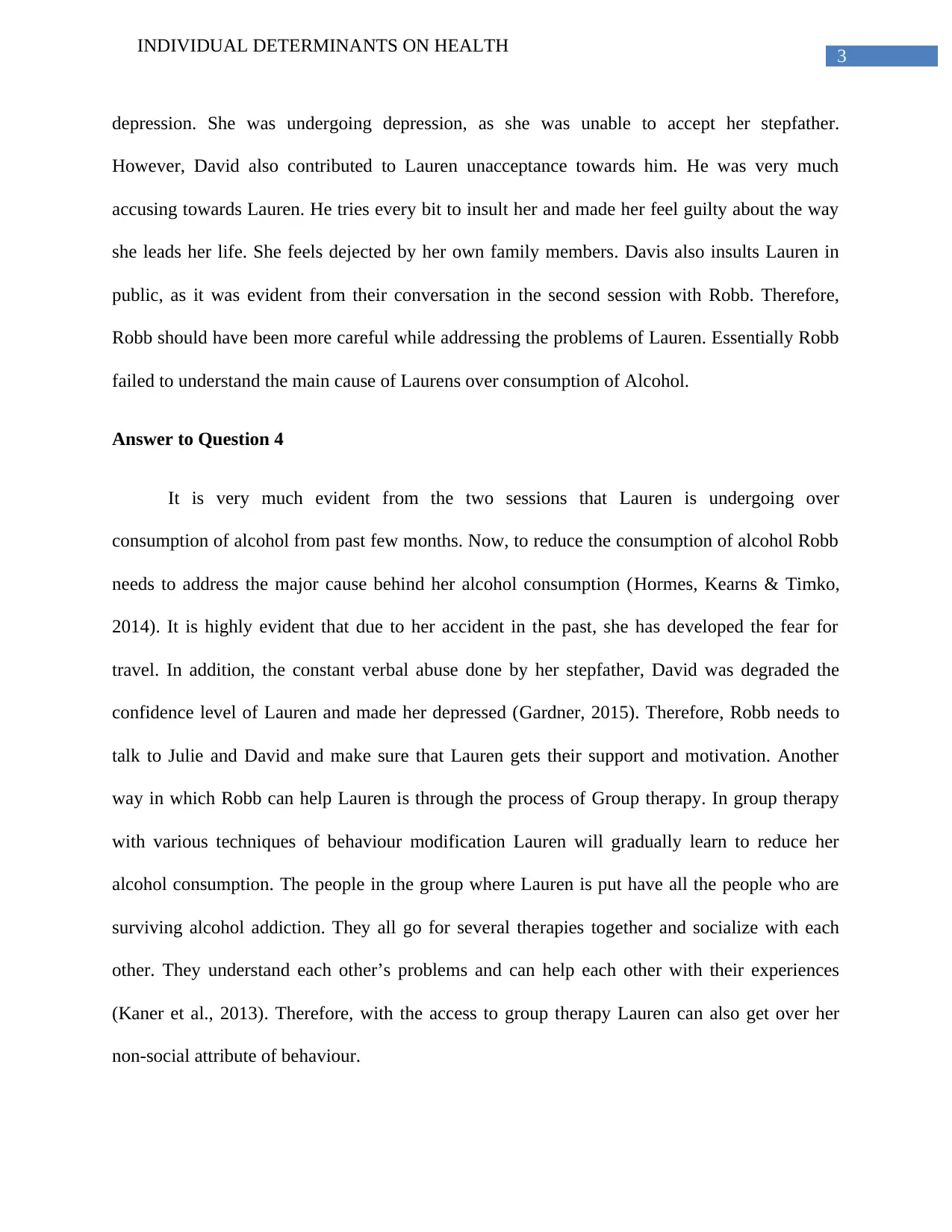
3
INDIVIDUAL DETERMINANTS ON HEALTH
depression. She was undergoing depression, as she was unable to accept her stepfather.
However, David also contributed to Lauren unacceptance towards him. He was very much
accusing towards Lauren. He tries every bit to insult her and made her feel guilty about the way
she leads her life. She feels dejected by her own family members. Davis also insults Lauren in
public, as it was evident from their conversation in the second session with Robb. Therefore,
Robb should have been more careful while addressing the problems of Lauren. Essentially Robb
failed to understand the main cause of Laurens over consumption of Alcohol.
Answer to Question 4
It is very much evident from the two sessions that Lauren is undergoing over
consumption of alcohol from past few months. Now, to reduce the consumption of alcohol Robb
needs to address the major cause behind her alcohol consumption (Hormes, Kearns & Timko,
2014). It is highly evident that due to her accident in the past, she has developed the fear for
travel. In addition, the constant verbal abuse done by her stepfather, David was degraded the
confidence level of Lauren and made her depressed (Gardner, 2015). Therefore, Robb needs to
talk to Julie and David and make sure that Lauren gets their support and motivation. Another
way in which Robb can help Lauren is through the process of Group therapy. In group therapy
with various techniques of behaviour modification Lauren will gradually learn to reduce her
alcohol consumption. The people in the group where Lauren is put have all the people who are
surviving alcohol addiction. They all go for several therapies together and socialize with each
other. They understand each other’s problems and can help each other with their experiences
(Kaner et al., 2013). Therefore, with the access to group therapy Lauren can also get over her
non-social attribute of behaviour.
INDIVIDUAL DETERMINANTS ON HEALTH
depression. She was undergoing depression, as she was unable to accept her stepfather.
However, David also contributed to Lauren unacceptance towards him. He was very much
accusing towards Lauren. He tries every bit to insult her and made her feel guilty about the way
she leads her life. She feels dejected by her own family members. Davis also insults Lauren in
public, as it was evident from their conversation in the second session with Robb. Therefore,
Robb should have been more careful while addressing the problems of Lauren. Essentially Robb
failed to understand the main cause of Laurens over consumption of Alcohol.
Answer to Question 4
It is very much evident from the two sessions that Lauren is undergoing over
consumption of alcohol from past few months. Now, to reduce the consumption of alcohol Robb
needs to address the major cause behind her alcohol consumption (Hormes, Kearns & Timko,
2014). It is highly evident that due to her accident in the past, she has developed the fear for
travel. In addition, the constant verbal abuse done by her stepfather, David was degraded the
confidence level of Lauren and made her depressed (Gardner, 2015). Therefore, Robb needs to
talk to Julie and David and make sure that Lauren gets their support and motivation. Another
way in which Robb can help Lauren is through the process of Group therapy. In group therapy
with various techniques of behaviour modification Lauren will gradually learn to reduce her
alcohol consumption. The people in the group where Lauren is put have all the people who are
surviving alcohol addiction. They all go for several therapies together and socialize with each
other. They understand each other’s problems and can help each other with their experiences
(Kaner et al., 2013). Therefore, with the access to group therapy Lauren can also get over her
non-social attribute of behaviour.
Paraphrase This Document
Need a fresh take? Get an instant paraphrase of this document with our AI Paraphraser
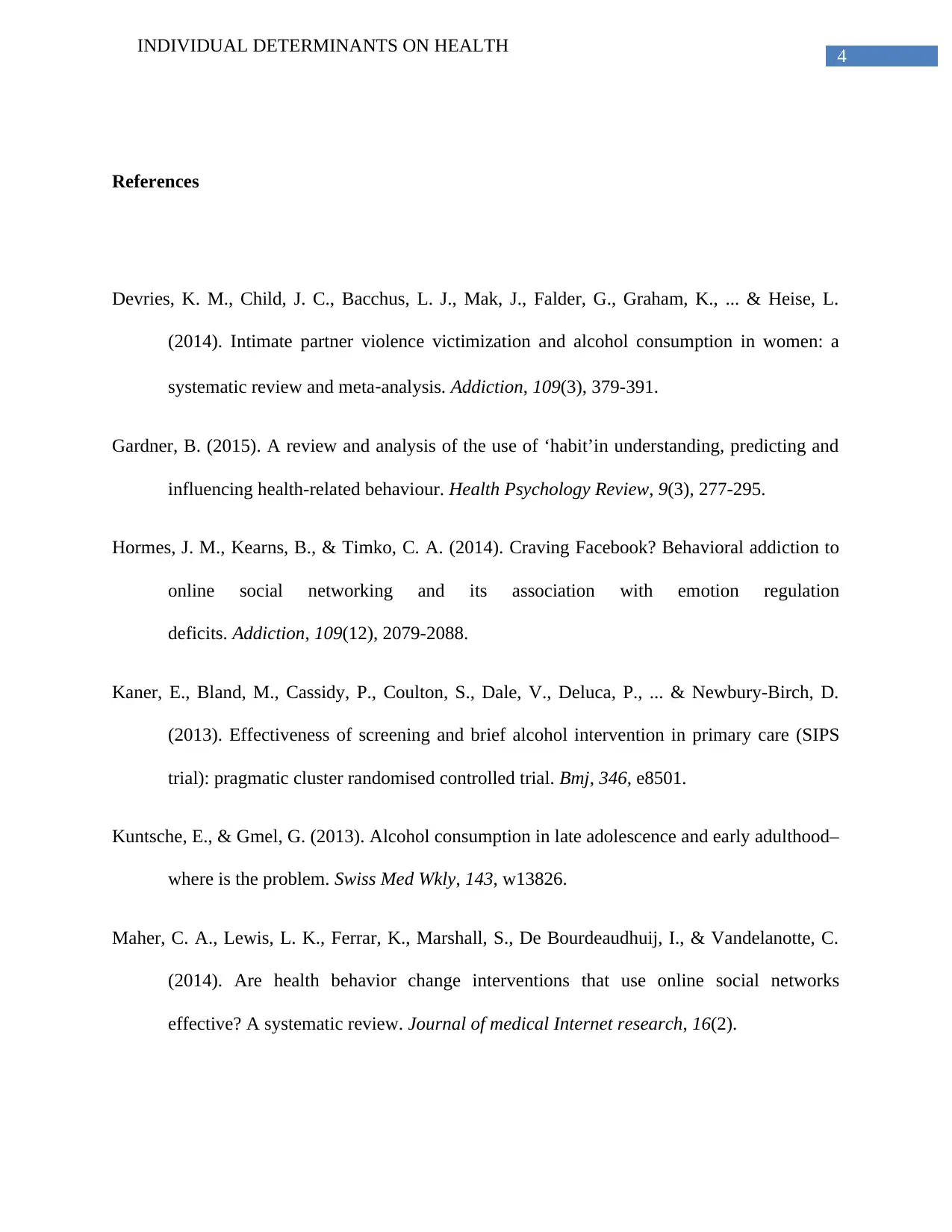
4
INDIVIDUAL DETERMINANTS ON HEALTH
References
Devries, K. M., Child, J. C., Bacchus, L. J., Mak, J., Falder, G., Graham, K., ... & Heise, L.
(2014). Intimate partner violence victimization and alcohol consumption in women: a
systematic review and meta‐analysis. Addiction, 109(3), 379-391.
Gardner, B. (2015). A review and analysis of the use of ‘habit’in understanding, predicting and
influencing health-related behaviour. Health Psychology Review, 9(3), 277-295.
Hormes, J. M., Kearns, B., & Timko, C. A. (2014). Craving Facebook? Behavioral addiction to
online social networking and its association with emotion regulation
deficits. Addiction, 109(12), 2079-2088.
Kaner, E., Bland, M., Cassidy, P., Coulton, S., Dale, V., Deluca, P., ... & Newbury-Birch, D.
(2013). Effectiveness of screening and brief alcohol intervention in primary care (SIPS
trial): pragmatic cluster randomised controlled trial. Bmj, 346, e8501.
Kuntsche, E., & Gmel, G. (2013). Alcohol consumption in late adolescence and early adulthood–
where is the problem. Swiss Med Wkly, 143, w13826.
Maher, C. A., Lewis, L. K., Ferrar, K., Marshall, S., De Bourdeaudhuij, I., & Vandelanotte, C.
(2014). Are health behavior change interventions that use online social networks
effective? A systematic review. Journal of medical Internet research, 16(2).
INDIVIDUAL DETERMINANTS ON HEALTH
References
Devries, K. M., Child, J. C., Bacchus, L. J., Mak, J., Falder, G., Graham, K., ... & Heise, L.
(2014). Intimate partner violence victimization and alcohol consumption in women: a
systematic review and meta‐analysis. Addiction, 109(3), 379-391.
Gardner, B. (2015). A review and analysis of the use of ‘habit’in understanding, predicting and
influencing health-related behaviour. Health Psychology Review, 9(3), 277-295.
Hormes, J. M., Kearns, B., & Timko, C. A. (2014). Craving Facebook? Behavioral addiction to
online social networking and its association with emotion regulation
deficits. Addiction, 109(12), 2079-2088.
Kaner, E., Bland, M., Cassidy, P., Coulton, S., Dale, V., Deluca, P., ... & Newbury-Birch, D.
(2013). Effectiveness of screening and brief alcohol intervention in primary care (SIPS
trial): pragmatic cluster randomised controlled trial. Bmj, 346, e8501.
Kuntsche, E., & Gmel, G. (2013). Alcohol consumption in late adolescence and early adulthood–
where is the problem. Swiss Med Wkly, 143, w13826.
Maher, C. A., Lewis, L. K., Ferrar, K., Marshall, S., De Bourdeaudhuij, I., & Vandelanotte, C.
(2014). Are health behavior change interventions that use online social networks
effective? A systematic review. Journal of medical Internet research, 16(2).
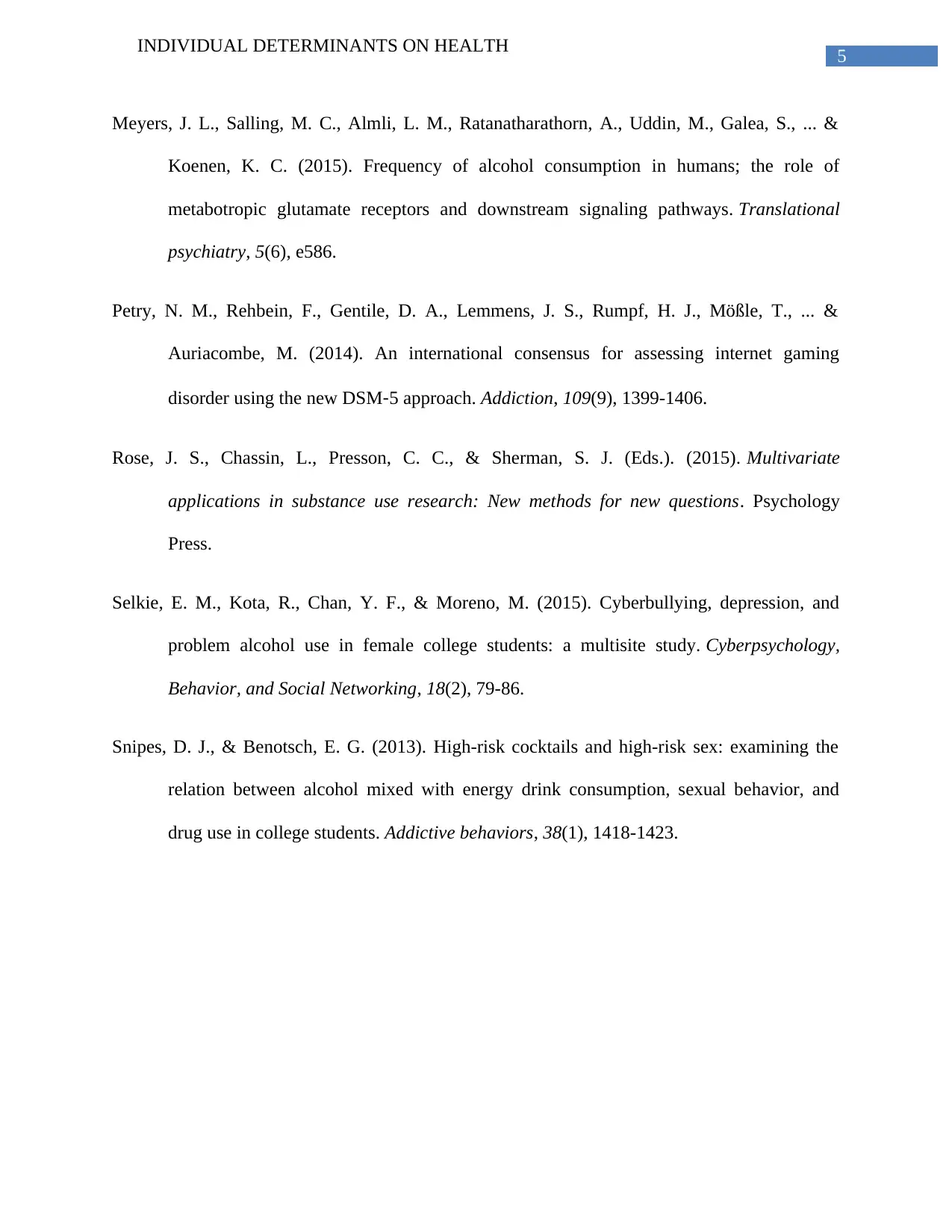
5
INDIVIDUAL DETERMINANTS ON HEALTH
Meyers, J. L., Salling, M. C., Almli, L. M., Ratanatharathorn, A., Uddin, M., Galea, S., ... &
Koenen, K. C. (2015). Frequency of alcohol consumption in humans; the role of
metabotropic glutamate receptors and downstream signaling pathways. Translational
psychiatry, 5(6), e586.
Petry, N. M., Rehbein, F., Gentile, D. A., Lemmens, J. S., Rumpf, H. J., Mößle, T., ... &
Auriacombe, M. (2014). An international consensus for assessing internet gaming
disorder using the new DSM‐5 approach. Addiction, 109(9), 1399-1406.
Rose, J. S., Chassin, L., Presson, C. C., & Sherman, S. J. (Eds.). (2015). Multivariate
applications in substance use research: New methods for new questions. Psychology
Press.
Selkie, E. M., Kota, R., Chan, Y. F., & Moreno, M. (2015). Cyberbullying, depression, and
problem alcohol use in female college students: a multisite study. Cyberpsychology,
Behavior, and Social Networking, 18(2), 79-86.
Snipes, D. J., & Benotsch, E. G. (2013). High-risk cocktails and high-risk sex: examining the
relation between alcohol mixed with energy drink consumption, sexual behavior, and
drug use in college students. Addictive behaviors, 38(1), 1418-1423.
INDIVIDUAL DETERMINANTS ON HEALTH
Meyers, J. L., Salling, M. C., Almli, L. M., Ratanatharathorn, A., Uddin, M., Galea, S., ... &
Koenen, K. C. (2015). Frequency of alcohol consumption in humans; the role of
metabotropic glutamate receptors and downstream signaling pathways. Translational
psychiatry, 5(6), e586.
Petry, N. M., Rehbein, F., Gentile, D. A., Lemmens, J. S., Rumpf, H. J., Mößle, T., ... &
Auriacombe, M. (2014). An international consensus for assessing internet gaming
disorder using the new DSM‐5 approach. Addiction, 109(9), 1399-1406.
Rose, J. S., Chassin, L., Presson, C. C., & Sherman, S. J. (Eds.). (2015). Multivariate
applications in substance use research: New methods for new questions. Psychology
Press.
Selkie, E. M., Kota, R., Chan, Y. F., & Moreno, M. (2015). Cyberbullying, depression, and
problem alcohol use in female college students: a multisite study. Cyberpsychology,
Behavior, and Social Networking, 18(2), 79-86.
Snipes, D. J., & Benotsch, E. G. (2013). High-risk cocktails and high-risk sex: examining the
relation between alcohol mixed with energy drink consumption, sexual behavior, and
drug use in college students. Addictive behaviors, 38(1), 1418-1423.
⊘ This is a preview!⊘
Do you want full access?
Subscribe today to unlock all pages.

Trusted by 1+ million students worldwide
1 out of 6
Related Documents
Your All-in-One AI-Powered Toolkit for Academic Success.
+13062052269
info@desklib.com
Available 24*7 on WhatsApp / Email
![[object Object]](/_next/static/media/star-bottom.7253800d.svg)
Unlock your academic potential
Copyright © 2020–2026 A2Z Services. All Rights Reserved. Developed and managed by ZUCOL.





